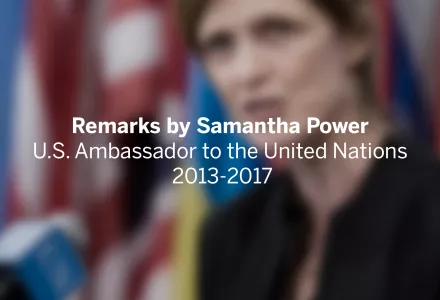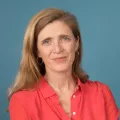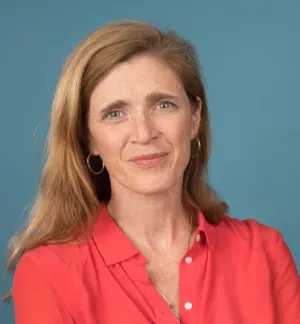
Thank you, Madame President. Let me begin by thanking Nigeria for keeping the international community focused on Ebola with this session, and, of course, for deploying more than 500 health workers to the affected countries at the peak of the outbreak – when they were so desperately needed. I also want to commend Nigeria’s swift and methodical response to two outbreaks within its own borders during the epidemic – including one in Lagos, a city of more than 21 million people – which show how we can effectively contain Ebola with the right response.
I’d also like to thank all of today’s briefers for their contributions – WHO Director-General Dr. Margaret Chan, UN Special Envoy Dr. David Nabarro, PBC Chair and his representative here, and the African Union Permanent Representative, Ambassador Tete Antonio. We express our immense gratitude to the men and women of your various organizations on the front lines of this fight, helping communities rebuild and recover.
And lastly, thanks to Dr. Mosoka Fallah, who took time away from his daily work with his fellow Liberians to share his story and the story of community, solidarity and leadership. Dr. Fallah, when other people were fleeing the growing outbreak, you ran headfirst into it. Where others saw an impenetrable climate of fear and distrust, you saw what you described here again today: communities yearning to be empowered to stand up to this deadly virus, and those communities, with your support and partnership, went about building their trust and knowledge – household by household, and block by block. We are in awe of your bravery and your determination, and above all, the compassion you showed for your fellow Liberians.
Let me begin with what we all know: we have made tremendous progress toward stopping this deadly outbreak. According to WHO, in the week that ended August 9th, only three new cases of Ebola were reported in the affected countries – one in Sierra Leone and two in Guinea. Three cases in a week – across three countries. How many members of this Council would have believed that possible a year ago, when we were seeing three, four or more cases pop up each day in individual households across the region? When three new cases arriving in a single field clinic would have been considered a slow day.
But it would be a serious mistake to take our eye off the current outbreak, or to think that, when we end it, our job will be done. So today, I want to briefly set out three steps the region and the international community must take to address this outbreak and help prevent future ones from reaching such devastating proportions.
First and most obvious: we must work relentlessly to get to zero. Ebola is a cunning virus – capable of exploiting even the slightest slip-up, delay, or other weakness in our response. A single missed link in the chain – a contact who’s not traced; a burial that is not carried out safely; a symptomatic patient who is not properly tested or quarantined – any single mistake or weakness can itself spawn a new deadly branch of this outbreak. So while the procedures that have been put in place may feel onerous at times – they are critically important, as is our constant vigilance.
Even when a country gets to zero, as we have seen, new outbreaks can and will occur. The true measure of the progress made and systems put in place will be how early these systems can detect and then contain any new outbreaks.
Consider Sierra Leone’s Tonkolili district where, on July 24th, the first case of Ebola was reported in more than 150 days. In response, national and international experts traveled immediately to the area, where more than 500 people were quarantined, including 29 high-risk contacts, two of whom tested positive for Ebola.
Contact teams deployed to trace possible lines of transmission. Local religious and community leaders were engaged to inform nearby communities about symptoms and what to do if they detected them. This is the kind of effort that is needed to prevent new outbreaks from becoming epidemics.
Second, as others have noted, we need to build up the public health systems and improve primary care in the affected countries, as well as countries with similar vulnerabilities, of which there are many. This means strengthening the institutions themselves and supporting the people who make them work. As this outbreak demonstrated, Ebola thrives in places with fragile and overstretched health systems and limited public health capabilities. And by allowing the virus to spread faster and wider – these vulnerabilities not only pose a threat to people living in countries with weak systems, but they pose a threat to people everywhere.
Last month’s International Ebola Recovery Conference was aimed at just this: strengthening public health systems in Guinea, Liberia, and Sierra Leone. It is critically important that all countries deliver on the pledges that they made at this conference – and the pledges they made before it, for that matter.
Third, we need to understand how our global health and emergency response architecture allowed the epidemic to spread so wide before stepping in and scaling up. Several critical efforts have been undertaken to identify crucial flaws in the response, including the report issued by the WHO Ebola Interim Assessment Panel and the UN High-Level Panel on the Global Response to Health Crises, whose final report is forthcoming. We urge those involved to put forward concrete, actionable recommendations on the systemic reforms needed to ensure timely, effective, and coordinated responses. And we welcome the commitment Doctors Chan and Nabarro have made to undertake swift reforms within WHO. These reforms necessitate support from all partners and Member States.
Here are just a few of the questions these efforts should seek to answer. Why did it take the UN, its agencies, and all of us so long to be seized by the urgency and magnitude of this outbreak? What was lost between staff on the ground – people like Dr. Fallah, people who were seeing clinics overflow and bodies abandoned in the streets – and people like us, with the power to catalyze an effective response? Would critical resources, time, and energy have been saved by relying on existing UN and international structures to coordinate the emergency response, rather than creating a new one in UNMEER? Or did UNMEER add value? If we had the response to do over again or if we confront another outbreak, bottom line, what would we do differently?
Of course, the value of these exercises rests not on the diagnoses, but on swift implementation of any remedies identified. Here, too, the international community’s continued engagement is crucial.
Last September, when the United States had the privilege of chairing an emergency meeting of the Security Council to try to rally international support for the Ebola response, I noted then that we knew how to bend the outbreak’s deadly curve – it was just a question of marshaling the resources and the will to do it. “The math is simple,” I said at the time, “the sooner we act, the more lives we save.”
The same is true today. Only we are no longer just talking about this Ebola outbreak, but other disease outbreaks that will inevitably follow. Get to zero. Build more resilient public health systems that everyone can access. Learn from our mistakes. If we do this, we will go a long way toward preventing the next outbreak from taking so many lives and tearing apart so many families and communities. The math is still simple: the sooner we act, the more lives we save.
Let me close finally by telling you about just one of those lives saved. On July 24th, 2014, just over a year ago, a 44-year-old emergency room doctor named Philip Ireland was headed to a staff meeting at JFK Memorial Hospital in Monrovia, Liberia, when he was struck with a headache so severe he saw flashes of light. His heart rate shot up and he felt feverish. He suspected he had Ebola, but the few clinics in Monrovia taking suspected patients were overflowing, so he quarantined himself at home. His mother made her own PPE suit out of rain gear and household gloves so she could care for him, but Dr. Ireland’s condition continued to deteriorate until, by the seventh day, he couldn’t feel his own pulse and was rushed to an Ebola Treatment Unit, or ETU.
His first night in the ETU, he had diarrhea 46 times and vomited 26 times. “I woke up barely alive, in a sea of mess,” he said. But in what he later described as, “the most touching act of kindness one could ever imagine,” a physician’s assistant named Patrick came to Dr. Ireland the next morning, bathed him, dressed him, and put him in a clean bed. Then Patrick prayed with him. “That man changed my view when it comes to how to give empathy and care for a patient,” Dr. Ireland said. “I know, because I was the patient who was dying.” Day by day, Dr. Ireland got stronger. And 14 days later, he was released – Ebola free.
Today, Dr. Ireland is back in JFK Memorial Hospital in Monrovia, where he is not only treating patients again, but is also helping train a new generation of Liberian doctors and nurses. He sees it as part of his duty – a way of rebuilding a health system decimated by the virus that almost took his life. And at the end of each day, he goes home to his wife and five children.
That is one life. One life saved in an outbreak that, to date, has taken the lives of more than 500 health professionals, and more than 11,000 lives overall. Just imagine, for one moment, how glad we will be the next time around if we take the steps today that will save thousands of lives later.
Thank you.
###
Power, Samantha. “Remarks by Ambassador Samantha Power at a UN Security Council Briefing on Ebola.” August 13, 2015


